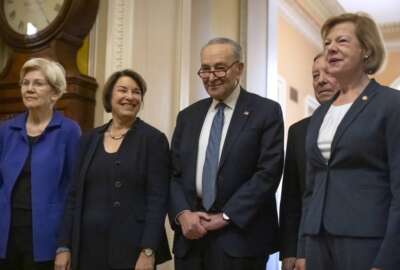FOIA updates help, but don’t fix all info request problems
In today's Top Federal Headlines, the new FOIA Improvement Act won’t patch every hole in the information request process, and the Senate Armed Services Committee...
The Federal Headlines is a daily compilation of the stories you hear discussed on Federal Drive with Tom Temin.
- The new FOIA Improvement Act will help, but won’t solve every problem with the information request process. According legal experts, the law does nothing to address the culture of secrecy under which agencies still operate. The Freedom of Information Act recently turned 50 years old. (U.S. Judiciary Committee)
- The Merit Systems Protection Board has warned agency hiring managers that nepotism occurs too often. It’s against federal policy to hire family members or other loved ones. The Board said especially before a presidential transition, employee turnover tends to rise. That’s often when managers turn to nepotism to fill out their ranks quickly. (Federal News Radio)
- The Office of Special Counsel received more than 6,000 cases in 2015 — well over 2014’s record of 5,100. Prohibited personnel practice and whistleblower reprisal cases rose last year to the highest levels ever. Employees at the Veterans Affairs Department once again submitted the most claims at more than 2,100. (Federal News Radio)
- 3,000 newly hired cyber professionals is not nearly enough, so the White House has plans to hire more. The federal cyber workforce is getting a new career path and more specific training. A new memo and strategy from the Office of Management and Budget lays out a series of steps agencies should take to increase the number of people they recruit, train and prepare to protect federal networks. Among the new initiatives are an enterprise-wide workforce planning effort to take advantage of certifications and training as well as plans for rotational assignments and mentoring and coaching programs.
- Kimberly Moseley has become the new executive director of the Federal Service Impasses Panel. Moseley has been the principal trusted advisor to the Assistant Secretary for Human Resources and Administration at the Veterans Affairs Department. The Impasses Panel resolves stalled negotiations between agencies and unions representing federal employees. It operates under the Federal Labor Relations Authority. (U.S. Federal Labor Relations Authority)
- Another 560 U.S. troops head to Iraq. Defense Secretary Ash Carter said that’ll bring the total to about 4,700. The Iraq move, combined with President Obama’s decision to keep more troops in Afghanistan, puts pressure on DoD to find a way to pay for it all. Carter mulls asking Congress for a supplemental war fund.
- The Government Accountability Office has said it’s time for the Army to revisit its approach to treating wounded warriors. The Army set up 45 Warrior Transition Units nearly a decade ago in response to reports of substandard and ad-hoc care for service members wounded in Iraq and Afghanistan. But a new GAO audit found the Army has never assessed whether the WTU model is actually effective. The watchdog also pointed out that the Army hasn’t changed the “triad of care” the WTUs are based on to reflect the fact that more and more of their patients have behavioral health diagnoses – up from 36 percent in 2008 to 52 percent in 2013.
- The Senate Armed Services Committee held a closed-door meeting on cybersecurity. Members are increasingly worried about U.S. cyber capabilities against its rivals. Both Democratic and Republican senators criticized the Obama administration’s cyber strategy. They say it’s not fully fleshed out and lacks a clear response if a cyber attack were to cause serious damage.
- Real Postal Service reform has advanced in the House. The House Committee on Oversight and Government Reform passed not one but two Postal Reform bills with bipartisan support. The first would establish a separate federal health plan tailored for postal employees’ demographics and push retirees to Medicare. And it would accelerate so-called cluster mail deliveries in many residential areas. A second bill would require the Treasury Department to more invest money in retiree health accounts more aggressively. (Committee on Oversight and Government Reform)
Copyright © 2024 Federal News Network. All rights reserved. This website is not intended for users located within the European Economic Area.
Related Stories
A quarter of FDIC survey respondents say harassment is common in the workplace
Related Topics






